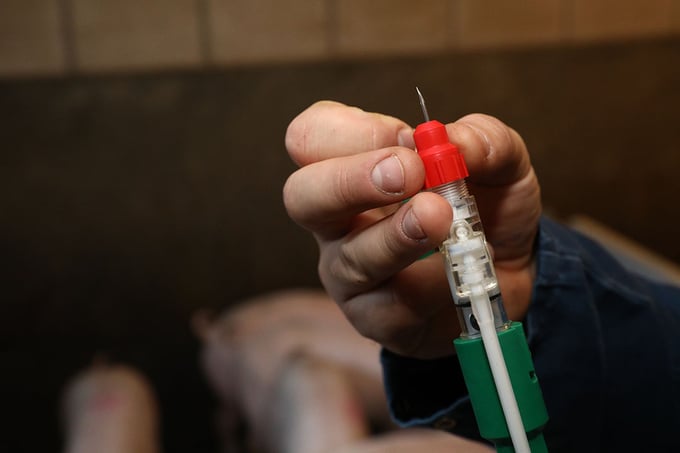November 27, 2025 | 23:55 GMT +7
November 27, 2025 | 23:55 GMT +7
Hotline: 0913.378.918
November 27, 2025 | 23:55 GMT +7
Hotline: 0913.378.918

The vaccine developed by ANSES’s scientists has the advantage of not being produced by genetic manipulation, making it easier to authorise its use. Photo: Henk Riswick
A vaccine to combat ASF could be produced based on research carried out by ANSES’s Ploufragan-Plouzané-Niort Laboratory. ‘The initial results obtained are promising and are paving the way for an effective means of combating this disease, which is responsible for high mortality rates in pigs and wild boar in several countries in Europe, Asia and the Caribbean,’ the French Agency for Food, Environmental and Occupational Health & Safety says.
Georgia 2007/1 viral strain
As part of its mandate as National Reference Laboratory for ASF, the Pig Virology and Immunology (VIP) Unit of ANSES’s Laboratory inactivated the Georgia 2007/1 viral strain, which is currently circulating in the European Union. While monitoring the effects of this heat inactivation, it happened to detect an attenuated strain, derived from the Georgia strain. This strain only caused a slight fever in infected animals, whereas infection with the Georgia strain is normally fatal in 100% of cases.
Mild symptoms
The team carried out a series of studies with this attenuated strain and confirmed that most pigs inoculated intramuscularly or oronasally with this virus showing only mild symptoms. Although safety was not perfect, survival was much better than with the original viral strain. “Intramuscular vaccination is the method most commonly used on farms” explains Marie-Frédérique Le Potier, Head of the VIP Unit. “Oral vaccination could be used to vaccinate wild boar using bait. This method was used for classical swine fever in the early 2000s and eradicated the disease from areas of France where it was present. That is why we tested both routes of administration from the beginning”.
Immune response
Another promising result is that infected pigs develop an immune response, which allows them to resist infection with the ASF virus without showing any symptoms, as early as 2 weeks after vaccination. These results were published in the journal Viruses in December 2022.
ANSES’s scientists continued to work on the attenuated strain, in particular so that it could multiply in cell lines produced in vitro and not in cells that had to be taken from pigs, as had initially been the case. This step was a success, raising the possibility of producing the vaccine on a large scale. As an added bonus, the strain of virus produced in this way caused fewer symptoms than the original attenuated strain, while still being effective.
Retransmission
Studies are still under way, in particular to ensure that this attenuated strain is not transmissable from one animal to another or become virulent again. The scientists will also assess the ability of the vaccine to prevent animals that are vaccinated and then exposed to the pathogenic ASF virus from retransmitting the virus.
No genetic manipulation
The vaccine developed by ANSES’s scientists has the advantage of not being produced by genetic manipulation, making it easier to authorise its use in the wild. In order for these discoveries to lead to effective industrial developments and ultimately to the production of vaccines, it must be possible to transfer them to the veterinary pharmaceutical industry. To this end, the laboratory filed a patent for the vaccine that was published last August. The Ouest Valorisation Technology Transfer Office (TTO) is supporting ANSES in encouraging interested manufacturers to exploit this patent.
(PP)

(VAN) A new study reveals how the simultaneous effects of ocean acidification, salinity and loss of oxygen are making the world more fragile.

(VAN) Hopes are growing that the creation of the first 3D turkey gut model could be a turning point in the battle against the virulent blackhead disease.

(VAN) Tyson, America’s biggest meat supplier, plans to shutter one of its largest beef processing plants as the industry continues to struggle with low cattle supplies and political pressure from Washington.

(VAN) New FAO study shows how digital solutions are empowering farmers and fishers to prevent losses and build resilient agrifood systems.

(VAN) Brazil's COP30 presidency pushed through a compromise climate deal on Saturday that would boost finance for poor nations coping with global warming but that omitted any mention of the fossil fuels driving it.

(VAN) Poultry farmers in the UK have been warned that they could face one of the worst winters yet for bird flu.

(VAN) Prices of main-crop paddy have risen sharply, with jasmine rice hitting 16,100 baht per tonne — the highest level in years.